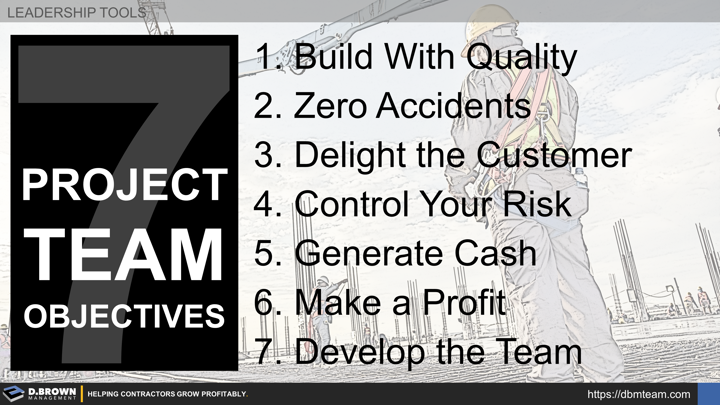- Build With Quality: Quality at the craft level and adherence to building codes is the minimum. Quality in the eyes of the customer and other stakeholders is what is truly critical. Learn more about how to identify the customer's Conditions of Satisfaction (CoS) and use them as a guide throughout the whole construction process, starting with business development and preconstruction. Whether you are a specialty contractor or general contractor, understanding what matters to the project owner and helping them achieve that is the foundation of growth through negotiated work.
- Zero Accidents: You can only take safety so far through rules and compliance. Truly safe environments must be created by cultural changes. It is easy to measure safety outcomes - and that should be measured. It is far more important to focus on the culture, accountabilities, management systems, and daily behaviors that lead to safe outcomes. Mark Breslin describes the weight of safety accountability at the Foreman level very well.
- Delight the Customer: Your #1 predictor of sustainable growth is what percentage of your customers absolutely love and promote you. Are your customers giving your company preference on winning a project? Are they asking for specific project team members by name? Learn to measure customer satisfaction as rigorously as you measure profitability and cash flow.
- Control Your Risk: Mitigating the downside risks on a project and the company as a whole requires a holistic approach and understanding the broader value stream starting with the design. Risks are different on each project and must be identified and managed from the start regardless. The delivery method is just one variable when it comes to risks and accountabilities.
- Generate Cash: You won’t be able to serve your customers if your whole team is not focused on every detail of improving cash flow.
- Make a Profit: Business is a game and profitable growth is part of the scorecard. Profits allow reinvestment in people, technology, tools, equipment, and facilities that allow for continued growth.
- Develop the Team: Everything good or bad that happens on a project comes down to talent. Building talent is not something that can be 100% delegated. It is a team sport. The construction industry is facing a huge talent shortage so the contractors that are winning tomorrow are those investing in developing talent today. You can plan for the continued decline in management talent.
Everyone on the project team owns a piece of each one of these. How clearly are your job descriptions aligned around achieving these objectives?
- Foreman / General Foreman / Superintendent
- Estimator / Chief Estimator
- Preconstruction Manager
- Detailer / Designer
- Fabrication Manager
- Buyer / Purchasing Manager
- Field Engineer / Project Engineer / Project Manager / Project Executive
- Project Coordinator / Project Accountant
Self-Evaluation Questions
- For each of these seven basic objectives, what are the top 1-3 metrics you could look at to see how you are doing on each? These may be explicit hard metrics like you have for cash flow or more anecdotal.
- What are the key roles that make up your project team?
- What are the top 1-3 leading activities do each of these roles have direct responsibility and management accountability for as related to your answers to #1?
- For each person that is in the roles (#2), how would you evaluate them 0-10 on each of these leading activities (#3)?
- Recommended: Share your leading activities and lagging measures with your project team and have them self-evaluate. This will create engagement.
- What patterns do you see, if any?
- What are some specific next steps that would help improve the evaluation scores?

